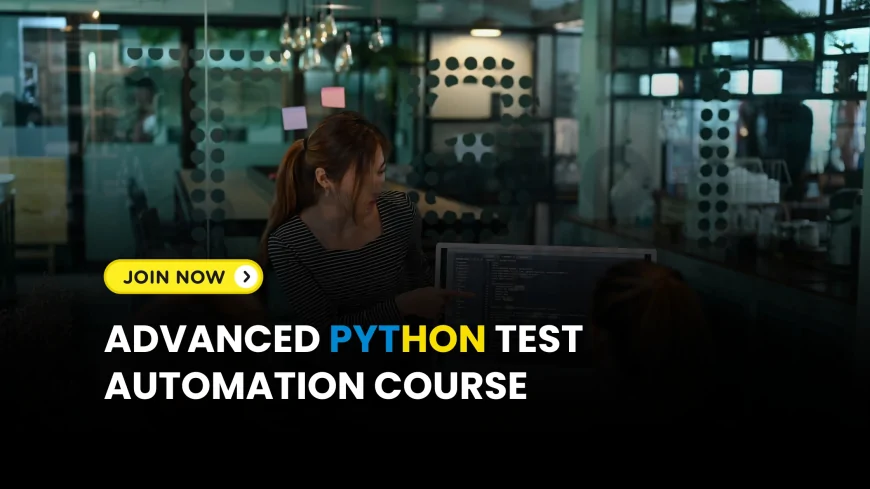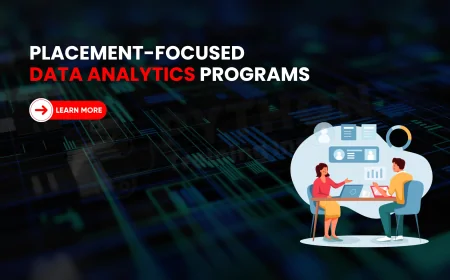Python Test Automation Course in Pune | Advanced Python Test Automation Classes Pune
Master test automation with Python in Pune. Learn Selenium, PyTest, frameworks, live projects, and get job-ready with certification support

Overview
With increasing reliance on continuous integration, automation testers have become indispensable. If you're looking to master testing skills and want a solid foundation in real-time test automation, enrolling in a Python Test Automation course in Pune is a great career move. This course blends Python programming, testing frameworks like PyTest and unittest, automation tools such as Selenium, and CI/CD pipelines to help you become a proficient automation engineer.
Why Python for Test Automation?
Python has rapidly become the preferred language for test automation professionals due to its simplicity, flexibility, and vast ecosystem of testing tools. Here’s why Python stands out in the automation landscape:
- Readable Syntax: Python’s readability ensures that both novice and experienced testers can efficiently develop and update test cases.
- Extensive Libraries: Python supports robust test automation libraries such as PyTest, unittest, behave, and nose2.
- Seamless Integration: Python works seamlessly with industry-standard tools, enabling QA teams to implement comprehensive test automation strategies.
- Cross-Platform Compatibility:Python’s OS-agnostic capabilities enhance automation testing by covering various systems and browsers efficiently.
- Community Support:Python’s popularity means there’s a rich pool of tutorials, Q&A threads, GitHub projects, and automation plugins available.
- API Testing Ready: With libraries like
requestsandhttp.client, Python is perfect for RESTful API testing. - Ideal for Frameworks: Python is often used to develop scalable test automation frameworks, including POM (Page Object Model) and hybrid-driven models.
Its strengths in flexibility, integration, and readability make Python the smart choice for comprehensive automation workflows.
Course Highlights
- Instructor-led live sessions (online & offline)
- Hands-on projects based on real testing scenarios
- Learn Selenium WebDriver with Python
- Master frameworks like PyTest and Robot
- Includes CI/CD concepts using Jenkins & GitHub Actions
- Resume building & interview prep sessions
- Industry-recognized certificate on course completion
Course Curriculum
This job-oriented Python automation course covers:
- Python Basics for QA
- Working with Variables, Loops, Functions, and Data Types
- OOP Concepts and Exception Handling
- Introduction to Testing and Test Automation
- Using PyTest and Unittest
- Test Suites, Fixtures, Assertions
- Selenium WebDriver with Python
- Locators, Waits, Actions, and Web Elements
- Automation Framework Design (Hybrid, Data-driven)
- Page Object Model (POM) Implementation
- API Testing with Python and Postman
- Version Control with Git & GitHub
- Continuous Integration using Jenkins
- Real-time Capstone Project
Tools & Frameworks Covered
- Selenium WebDriver – for web application testing
- PyTest – for test case management
- Robot Framework – for keyword-driven testing
- Postman – for API testing
- Jenkins – for automation in CI/CD
- Git & GitHub – for source code version control
Real-Time Projects
Each student will work on live projects including:
- Automating login and form submissions using Selenium
- Creating a data-driven testing suite using PyTest
- Building a framework using POM architecture
- API automation and response validations using requests library
- End-to-end automation flow with CI/CD deployment on Jenkins
Certification & Career Support
Upon successful course completion, you will receive an industry-recognized certificate. Institutes also offer:
- Customized resume building for QA roles
- LinkedIn profile optimization
- Mock interviews and aptitude practice
- Referrals and access to job portals
Who Should Join?
- Manual testers aiming to transition into automation
- Freshers looking to enter the QA domain
- Developers seeking QA automation roles
- Students in CS/IT fields wanting to specialize in Python-based testing
- Professionals preparing for QA automation interviews
Top Institutes Offering Test Automation in Pune
WebAsha Technologies is among the leading training providers in Pune for Python-based test automation. The institute offers a flexible hybrid model (online + offline), project-based learning, and expert mentorship. Students learn Selenium WebDriver, PyTest, Robot Framework, API testing, and CI/CD tools like Jenkins and GitHub.
In addition to core technical training, WebAsha also provides hands-on capstone projects, resume-building support, mock interviews, and job placement assistance. Their curriculum is designed for both freshers and working professionals aiming to become automation engineers using Python.
Whether you’re transitioning from manual testing or starting your QA career, WebAsha Pune’s test automation course ensures industry readiness and confidence in real-world scenarios.
Student Testimonials
“WebAsha's automation course helped me land a QA job with Python skills. The real-time projects and mock interviews were extremely helpful.” – Ramesh K.
“I transitioned from manual testing to automation confidently thanks to their hybrid learning model and hands-on approach.” – Priyanka M.
Frequently Asked Questions (FAQs)
1. What is Python test automation?
Python test automation involves using Python scripts and libraries like Selenium, PyTest, and unittest to automate the testing of software applications.
2. Who can enroll in a Python Test Automation course?
Freshers, manual testers, software developers, and working professionals interested in automation testing can enroll.
3. Do I need prior programming experience?
No, most courses begin with Python basics and gradually introduce automation concepts, making it beginner-friendly.
4. What tools will I learn in this course?
You will learn Selenium WebDriver, PyTest, unittest, Robot Framework, Postman (for API testing), Jenkins, Git, and GitHub.
5. Are projects included in the training?
Yes, students work on real-time projects such as login automation, form validation, API testing, and complete test suites.
6. Will I get a certificate after completion?
Yes, upon completing the course and final project, you’ll receive a recognized certification from the training institute.
7. Is this course available online or offline?
Yes, the course is offered in both online and offline (classroom) modes. Hybrid options are also available in Pune.
8. How long is the course duration?
The course duration typically ranges from 6 to 10 weeks depending on the batch schedule (regular or weekend).
9. Do institutes offer placement assistance?
Yes, reputed institutes like WebAsha Technologies offer placement support including resume help, mock interviews, and job referrals.
10. What is Selenium, and why is it used?
Selenium is a popular open-source tool used to automate web browsers. It supports multiple languages including Python and is widely used in QA automation.
11. What is the difference between manual and automation testing?
Manual testing is performed by humans without scripts, while automation testing uses tools and code to execute tests automatically, improving speed and accuracy.
12. Is Python better than Java for test automation?
Python is often preferred for its simplicity and faster learning curve, especially for beginners, whereas Java is more verbose and used in legacy systems.
13. Will I learn to automate web and API testing?
Yes, the course covers both web UI automation using Selenium and API automation using tools like Postman and Python libraries.
14. Can I join if I'm working full-time?
Yes, many institutes offer weekend and evening batches to accommodate working professionals.
15. What is PyTest and how is it used?
PyTest is a testing framework in Python used to write simple and scalable test cases with features like fixtures, markers, and parametrization.
16. Are there any prerequisites for this course?
Basic computer skills and logical thinking are sufficient. Prior coding or testing experience is helpful but not mandatory.
17. Will I build an automation framework?
Yes, you'll learn to build data-driven and hybrid automation frameworks using POM (Page Object Model) architecture.
18. Can I attend demo sessions before enrolling?
Yes, most institutes offer free trial or demo classes so you can evaluate the teaching methodology and curriculum.
19. What kind of jobs can I get after the course?
You can apply for roles such as QA Automation Engineer, Python Test Engineer, Selenium Tester, and Software Test Analyst.
20. Why choose WebAsha Technologies in Pune for this course?
WebAsha Technologies offers industry-aligned curriculum, real-time projects, hybrid learning modes, and robust placement assistance, making it a top choice for QA training.
Conclusion
The Python Test Automation course in Pune is your gateway to a successful QA career. With strong curriculum coverage, expert mentorship, and hands-on project experience, you'll not only master automation tools but also build job-ready confidence. Whether you're switching careers or starting fresh, this course delivers everything you need to become an in-demand Python test automation professional.
What's Your Reaction?
 Like
0
Like
0
 Dislike
0
Dislike
0
 Love
0
Love
0
 Funny
0
Funny
0
 Angry
0
Angry
0
 Sad
0
Sad
0
 Wow
0
Wow
0
















